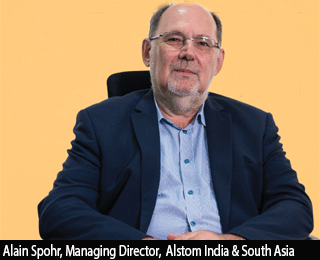 A more sustainable, futuristic urban mobility, both in terms of public transport and freight movement is being advocated globally. When it comes to a rapidly evolving economy like India, which is at the cusp of transformation, sustainable transportation will play a key role in helping the government and businesses. In line with the strong economy growth and rapid urbanization, the Government of India has undertaken various initiatives to modernise Indian Railways while exploring sustainable solutions for urban mobility.
A more sustainable, futuristic urban mobility, both in terms of public transport and freight movement is being advocated globally. When it comes to a rapidly evolving economy like India, which is at the cusp of transformation, sustainable transportation will play a key role in helping the government and businesses. In line with the strong economy growth and rapid urbanization, the Government of India has undertaken various initiatives to modernise Indian Railways while exploring sustainable solutions for urban mobility.From leading in signalling, to supplying largest number of metro trains, to dominating engineering and R&D space, Alstom is India’s true partner in mobility. “With its rich global experience, there are a lot of technological advancements that Alstom is bringing to India as well as developing indigenously”, says Alain Spohr, Managing Director, Alstom India & South Asia.
“Alstom has an order backlog of over €4 billion from its India operations. This is a strong indication of our key role in producing world-class rolling stock and components, signalling solutions, and delivering engineering services to various prestigious Indian as well as global mainline and metro projects”, he adds.
With the ambition of becoming the world’s first ‘net-zero’ carbon emitter by 2030, the Indian Railways has undertaken a multi-pronged approach to go green and decarbonize its operations. Synonymous with the country’s ‘Rail Revolution’, Alstom continues to be a strategic partner in supporting India’s freight revolution and passenger movement. The company has introduced several ground-breaking technologies in India and is continuing to modernize the urban and mainline railway sector. As part of the largest Foreign Direct Investment (FDI) project in the Indian Railway sector, Alstom is indigenously manufacturing 800 fully electric super powered double-section locomotives of 12,000 HP capable of hauling ~6000 tonnes at an approved speed of 120 KMPH.
Till date, 220 of these electric locomotives have been delivered. With this joint venture project underway, India has become the sixth country in the world to join the club of countries producing high horsepower locomotives indigenously. These electric locomotives have clocked over 22.8 million kilometres cumulatively, since its induction, hauling commodities such as coal, cement, food grains, fertilisers, petrochemical products, minerals, and posts/parcels. Alstom is also the OEM and pioneer in launching IGBT based three-phase propulsion for high horsepower locos manufactured by Indian Railways.
Today, there is a bit of Alstom in every metro project in the country, including Chennai, kochi, delhi, lucknow, Kanpur, Bangalore, Mumbai etc. The company is currently manufacturing cutting-edge rolling stock solutions for some of the most prestigious ongoing projects, including Kanpur-Agra Metro, and Mumbai Metro Line-3. For urban metro projects, Alstom is the market leader in the latest CBTC signalling technology in India.
Alstom is also manufacturing the first modern commuter & transit trains for Delhi-Ghaziabad-Meerut RRTS project, which is the first semi-highspeed corridor for intercity passenger travel in India. Manufactured at Alstom’s facility in Savli (Gujarat), these trains would be the first passenger trains manufactured and deployed by Alstom for mainline operations in India. The trains would run at a top speed of 180 kmph, reducing the travel time between Delhi-Meerut to under an hour. This revolutionary project is also going to witness the WORLD PREMIER of the European Train Control System (ETCS) signalling technology, that offers continuous radio-based automatic train protection. With ETCS, the RRTS corridor can attain higher-speed operation and ensure optimal network interoperability, while reducing the maintenance cost. In June 2020, Alstom received the complete certification of the latest ETCS standards.
The company has successfully delivered India’s first ‘Integrated Systems project for Railways’ on the Eastern Dedicated Freight Corridor, 351 kms Bhaupur – Khurja section with signalling, telecommunication, electrification, and setting up one of the world’s largest Operations Control Centre (OCC) in Uttar Pradesh. This is the first fully electrified operational section of the Dedicated Freight
Corridor project, which was inaugurated by Prime Minister Narendra Modi in December 2020.
‘Make in India’ for India and the World
In-line with Government of India’s Make-in-India & ‘Atmanirbhar Bharat’ initiative, Alstom has been investing heavily in the country. As stated by an official report by Ernst & Young, Alstom has contributed €438 million in indirect & induced GDP to India’s economy over the last few years. India is the third largest base in the world for Alstom, after France and Germany and the company has invested over €142 million locally in the past five years. The Company currently employs over 10000 employees in India and most of the manufacturing and engineering is localised out of the company’s six industrial and four engineering centres. Over 7 million engineering hours have been dedicated to research & development in India. Alstom remains deeply committed to strengthening its local sourcing and supply chain ecosystem.
Alstom India caters to international market requirements by delivering engineering, components, and fully built trainsets for various countries across the globe. In 2014, Alstom was awarded the contract to deliver 22 six-car trainsets for Sydney metro’s Northwest Rail Link. The metro trains were manufactured at Alstom’s urban Rolling Stock manufacturing unit in Sricity. In the following years, Alstom’s Metropolis and Urbalis solutions were customized for this line at the company’s engineering hub in Bangalore. Alstom also delivered metro trains manufactured at Savil for the Queensland metro project.
The newly inaugurated facility in Coimbatore is the company’s largest components manufacturing facility in Asia and is dedicated to improving industrial efficiency in manufacturing components for various prestigious national and international projects. This site is spread over a total area of 15 acres and has an installed capacity of 2.1 million hours that will offer a higher degree of production diversity & complexity – integration & testing of tractions, auxiliary convertors, cubicles, driver desks and Rolling Stock looms. Besides Indian projects, this site will support international projects in France, Canada, Italy, Belgium, Germany, Netherlands, Saudi Arabia, Vietnam, UAE and more.
Future Endeavors
Today, Alstom is the only company in the world to have hydrogen cell powered trains on tracks. Its hydrogen trains are mature in terms of availability and reliability, providing the same performance as traditional regional trains, but with the benefit of low noise and zero emissions. Alstom’s Coradia iLint is the world’s first hydrogen-fueled train for passenger travel, that is making way to commercial use in several European nations like France, Sweden and Poland. As a global leader in sustainable mobility with proven expertise in building Hydrogen fuel-based trains, Alstom can support the government in achieving its emissions reduction targets and pave the way for improved and enhanced sustainable mobility solutions.
As digitalization slowly begins to take over railways, there is a growing need to protect data and connected systems. “Alstom’s market-leading cybersecurity capabilities come with IT and OT security expertise, deep product knowledge and deployment experience. We look forward to bringing this to India as well”, he added.
“Alstom’s ambition is to accompany transportation stakeholders globally in meeting tomorrow’s mobility challenges. We have always been keen to explore suitable sustainable transport solutions and it is encouraging to see India draw up plans to bring in newer technologies like Metro Lite & Metro Neo. These technologies can be an optimized solution for medium to small size cities (with lesser passenger density), providing economically viable, safe commute options and address last mile connectivity challenges as well. With more than 30 Tier 2/3 cities, India could become one of the largest markets for Light Rail solutions”, concludes Alain.
‘Make in India’ for India and the World
In-line with Government of India’s Make-in-India & ‘Atmanirbhar Bharat’ initiative, Alstom has been investing heavily in the country. As stated by an official report by Ernst & Young, Alstom has contributed €438 million in indirect & induced GDP to India’s economy over the last few years. India is the third largest base in the world for Alstom, after France and Germany and the company has invested over €142 million locally in the past five years. The Company currently employs over 10000 employees in India and most of the manufacturing and engineering is localised out of the company’s six industrial and four engineering centres. Over 7 million engineering hours have been dedicated to research & development in India. Alstom remains deeply committed to strengthening its local sourcing and supply chain ecosystem.
Alstom India caters to international market requirements by delivering engineering, components, and fully built trainsets for various countries across the globe. In 2014, Alstom was awarded the contract to deliver 22 six-car trainsets for Sydney metro’s Northwest Rail Link. The metro trains were manufactured at Alstom’s urban Rolling Stock manufacturing unit in Sricity. In the following years, Alstom’s Metropolis and Urbalis solutions were customized for this line at the company’s engineering hub in Bangalore. Alstom also delivered metro trains manufactured at Savil for the Queensland metro project.
Currently, Alstom is delivering trainsets for a follow-up order from Sydney Metro for the City and Southwest link as well as trainsets for Montreal Metro, Canada (Réseau Express Métropolitain)
With its rich global experience, there are a lot of technological advancements that Alstom is bringing to India as well as developing indigenously
The newly inaugurated facility in Coimbatore is the company’s largest components manufacturing facility in Asia and is dedicated to improving industrial efficiency in manufacturing components for various prestigious national and international projects. This site is spread over a total area of 15 acres and has an installed capacity of 2.1 million hours that will offer a higher degree of production diversity & complexity – integration & testing of tractions, auxiliary convertors, cubicles, driver desks and Rolling Stock looms. Besides Indian projects, this site will support international projects in France, Canada, Italy, Belgium, Germany, Netherlands, Saudi Arabia, Vietnam, UAE and more.
Future Endeavors
Today, Alstom is the only company in the world to have hydrogen cell powered trains on tracks. Its hydrogen trains are mature in terms of availability and reliability, providing the same performance as traditional regional trains, but with the benefit of low noise and zero emissions. Alstom’s Coradia iLint is the world’s first hydrogen-fueled train for passenger travel, that is making way to commercial use in several European nations like France, Sweden and Poland. As a global leader in sustainable mobility with proven expertise in building Hydrogen fuel-based trains, Alstom can support the government in achieving its emissions reduction targets and pave the way for improved and enhanced sustainable mobility solutions.
As digitalization slowly begins to take over railways, there is a growing need to protect data and connected systems. “Alstom’s market-leading cybersecurity capabilities come with IT and OT security expertise, deep product knowledge and deployment experience. We look forward to bringing this to India as well”, he added.
“Alstom’s ambition is to accompany transportation stakeholders globally in meeting tomorrow’s mobility challenges. We have always been keen to explore suitable sustainable transport solutions and it is encouraging to see India draw up plans to bring in newer technologies like Metro Lite & Metro Neo. These technologies can be an optimized solution for medium to small size cities (with lesser passenger density), providing economically viable, safe commute options and address last mile connectivity challenges as well. With more than 30 Tier 2/3 cities, India could become one of the largest markets for Light Rail solutions”, concludes Alain.




